|
Friedrich Wilhelm Murnau, or F.W. Murnau as he was more commonly credited, should be a familiar name to site regulars and film fans in general, assuming your appreciation of cinema stretches beyond the last twenty years or so. He was, after all, responsible for a number of acknowledged classics, including the first and greatest film adaptation of Bram Stoker's seminal Dracula with Nosferatu, the most visually startling film version of Faust, the heart-rending Der letz Mann, and the magificent Sunrise, the only film to ever win Best Film Oscar in the category of 'Best Picture, Unique and Artistic Production'.
But there are a number of other highly regarded Murnau films that remain largely unseen by modern audiences, especially those of us living outside of Germany. Some have tragically been lost to posterity, but storming to the rescue on two of the survivors, yet again, is Germany's F.W. Murnau-Stiftung studio, whose painstaking restoration of Nosferatu remains something of a standard-setter for silent film digital reconstruction. Bringing them to an English speaking audience is the crew behind Eureka's Masters of Cinema titles, which has packaged both films as a double disc set with English subtitles, a detailed booklet and a fact-filled commentary track.
The two films in question are the 1922 Phantom and the 1924 Die Finanzen des Großherzogs [The Grand Duke's Finances], both made between Murnau's more widely seen and celebrated Nosferatu and Der letz Mann. Very different in tone and with little of the visual experimentation of his more famed works, they are nonetheless technically arresting and entertaining in their own right.
A title like Phantom can't help but trigger certain expectations, particularly when it's attached to a silent film made by F.W. Murnau immediately after his vampire masterpiece Nosferatu. Another tale of the supernatural, then? Er, no, not quite.
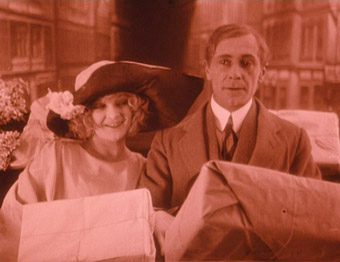
Phantom follows the misfortunes of one Lorenz Lubota, a mild mannered bookworm who lives with his elderly mother, his fun-loving sister Melanie, and his art student brother Hugo. On his way to work one morning, he's knocked down by a horse-drawn carriage driven by the wealthy and beautiful Veronika Harlan. She stops the make sure he's not injured and Lorenz is instantly captivated, forgeting all else to follow her back to her home. Distressed to learn that she is soon to be engaged, he approaches her parents for permission to court her, and is politely escorted out of the building with the suggestion that he ask again in a year or so, presumably after Veronika has been safely married and removed from the reach of this working class pest. Seemingly moments later, however, Lorenzo catches sight of Mellitta, who bears a striking facial resemblence to Veronika, and is immediately bewitched. Neither Mellitta nor her mother discourage Lorenzo's attentions, and after he spends the night with the new object of his affections, Melitta's mother reveals that they are destitute and hopes that this nice young man will be able to properly provide for her daughter.
Now I should point out that there's a lot more to the story than is covered by the above summary. As well as being an avid reader, Lorenzo is also an aspiring poet and shows some of his work to local bookbinder Starke, whose daughter Marie has a thing for this nice young man, one she's not got around to revealing to him. Starke thinks the poems are works of pure genius and passes them on to a renowned publisher for consideration, convinced that they will launch Lorenzo on a glittering literary career. Worried about meeting the publisher in his scruffy suit, Lorenzo borrows some cash from his aunt Schwabe, a successful pawnbroker who appears to dote on him. This pricks the interest of layabout playboy Wigottschinski, who's been feigning an interest in Schwabe in the hope of nabbing her money. What Lorenzo doesn't realise is that Starke is a somewhat poor judge of literature and that his contact has no intention of publishing the poems, something Starke, in his embarrassment, chooses to keep to himself.
Are you following all this? Trust me, it's all perfectly clear on screen. Murnau was a master storyteller, and it's in the manner of its telling that Phantom exerts its hold. Characters are quickly established but are not always what they seem. Aunt Schwabe is initially demonised for her trade by Lorenzo's mother, but her affection for her nephew is clearly genuine and her belief that the world is otherwise populated by ne'er-do-wells later proves to be justified. Sister Melanie, meanwhile, is a bundle of confusion about her own desires and intentions, interested only in having fun at any cost one minute and dismayed at her actions and in her brother's arms the next, but ready to switch back at the drop of a Deutschmark. The only real constants are Lorenzo's mother, whose principled honesty and unquestioning devotion to her children costs her dear, and the unscrupulous Wigottschinski, the sort silent movie villain you'll have to lock up or shoot to teach any sort of lesson.
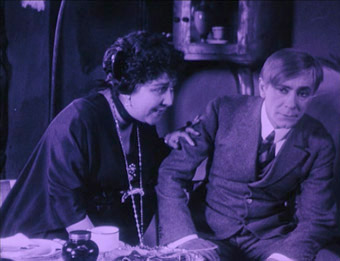
Murnau moves between the unfolding story strands with a fluidity and pace that we tend to associate with more recent cinema and with little of the expressionist visual pizzazz found in works such as Faust and Sunrise – Lorenzo's brief visions of his pursuit of Veronika aside, this is saved for an astonishing shot when he hits moral rock bottom and the entire street appears about to collapse down on him. The storyline is busy with incident and unfolds in generally enthralling fashion (the editing and cross-cutting between scenes is crucial to this), and is prefaced by a sequence in which a now married Lorenzo looks back on his descent into criminality, creating an ever-present degree of tension over just how and when this will occur.
The problem here, or rather my problem here, is that I found it hard to sympathise with Lorenzo's plight, for the simple reason that I found it hard to sympathise with Lorenzo. It's not that he's played by an actor who looks considerably older than his character (and one who delivers the most enjoyable performance in the companion film of this DVD release) or that he's a drippy bookworm – anyone this enthusiastic about book reading is OK by me. It's just that he's so utterly and completely self-absorbed that he rarely seems even remotely aware of the feelings of those around him, or the possible consequences of his actions on himself or others. He's astonishingly fickle in matters of love, falling head over heels for the wealthy Veronika on a single look at her face, yet after failing to secure her father's permission to court her, he switches his attentions in a second to pop-eyed look-alike Mellitta, suggesting it's not the woman he's fallen for but a specific image of womanhood. So instantly and completely smitten is he that, in order to provide her with shopping money, this previously decent and upright man all but ignores his poor mother and her steadily deteriorating health and – albiet reluctantly – teams up with a professional cad to rob a elderly female relation, one who has never shown him anything but kindness and who regards him as the one decent person in a world otherwise populated by scoundrels. That he loses his job before the film's end comes as no real surprise – indeed, given his indifference to the simple task of showing up for work, I'm amazed he was still in employment at the story's start. By the final third I stopped worrying about how he was going to end up in jail and began secretly urging the authorities to get round to his house and slap him in irons.
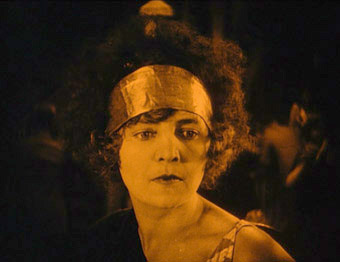
But despite this, Phantom remains a compellingly told tale, which has led to it being championed in some quarters as one of the director's unfairly forgotten greats, a view you may well find yourself sharing. Certainly its way with storytelling is up there with some of Murnau's best, but to buy into this one completely you need to be okay with the concept of obsessive, all-consuming and instantly transferable love at first sight based purely on facial features and not regard this as just a weeny bit shallow.
| Die Finanzen des Grossherzogs (The Grand Duke's Finances) |
|
If the very concept of an F.W. Murnau comic adventure story seems a little unlikely, then you've presumably either not seen his 1922 Die Finanzen des Großherzogs [The Grand Duke's Finances], or have watched it and remained stony faced throughout. Personally, I smiled a lot and occassionally laughed out loud, quite a feat for a film that concerns itself largely with the tomfoolery of the wealthy and overprivileged.
Actually keeping tabs on who is who and just what's going on requires your full attention here, and if you're planning to surf the net and eat a Bolognese whilst watching the film, you'll probably be lost in a matter of minutes. The story is divided into chapters, each with lengthy textual introductions in which characters and situations are established, allowing the film to dive straight into the story without anything approaching an on-screen build-up. Thus, when we first meet Don Roman, the Grand Duke of Abacco (an "incredibly small island, perhaps in the Mediterranean"), he's already on the brink of bankruptcy and owes a sizeable sum to moneylender Markowitz, who warns that if the debt is not paid within three days then he will legally take ownership of the whole island. As the Duchy's weary finance minister, Don Esteban Paqueno, reminds the Duke (and handily informs us), a marriage between with Russia's wealthy Crown Princess Olga would solve his financial woes, but Olga's brother Prince Nicolai has forbidden her to marry a man whose duchy consists entirely of debt.
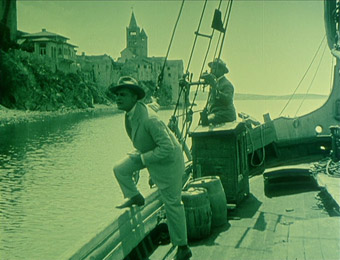
No sooner has Markowitz departed than self-satisfied opportunist Bekker turns up and offers to pay top dollar for part of the island, his intention being to mine it for sulphur using the island's inhabitants as labour. Outraged at a plan that could endanger the lives of his subjects, the Duke tosses Bekker out on his ear, but the man is not so easily disuaded and swears revenge for this perceived ill treatment. Paqueno is at a loss – after all, he reasons, a solution to their problems isn't going to just fall from the sky. Seconds later a light aircraft flies over and drops a solution to their problems from the sky. It's a letter from Princess Olga, who is touched by the Duke's devotion to his people and wants to marry him, regardless of her brother, and clear all of his debts. Hoorah! But in his new found serenity, Roman falls asleep in his garden and the letter is stolen from his hand...
And that's just the start of it. Still to be introduced are cheerful adventurer Philipp Collin, budding politician Isaaks, and a quartet of would-be island revolutionaries, one of whom is played by Count Orlock himself, Max Schreck, who it turns out wasn't a real vampire after all.* Also on the loose is an anonymous woman who's being chased across Europe by a descendant of Ivan the Terrible, or so the caption assures us. Plot complications pile up, as the location of the letter is revealed and then stolen by Collin while on a mission to help Isaaks, a stock market deal buys up all of Abacco's securities, Bekker funds an uprising against the Duke's rule, and Collin comes to the aid of the mysterious woman. The Duke remains impossibly cheerful throughout, only losing his cool at the thought of his throne in the hands of ruffians, a call to action that prompts almost everyone to make a beeline for Abacco, including the Russian navy.
It's a frothy but consistently entertaining jaunt, driven along by Murnau's way with pace, character detail and cross-cutting, the Duke's almost child-like optimism (we first see him delightedly throwing coins to swimming children and then slip into a boyish huff when told that Markowitz is demanding an audience), and Alfred Abel's engaging and immensely likeable performance as Collin. It's he that provides the film with its three funniest scenes, the first involving a glass of cognac and a fainted lady (a gag I've seen repeated many times since and that's reworked to add a jocular note to the ending), the second involving attempts to disguise the pursued woman with some absurd make-up ("Just as I have always imagined my wife!"). But both are outdone by an indoor greyhound race in which energetic hounds leap over furniture, trample over a visitor, and are pursued by a diminutive canine slowcoach in the manner that we'd nowadays regard as Disney-esque.
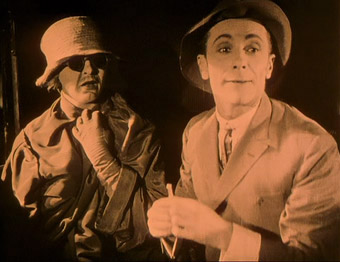
Die Finanzen des Großherzogs is often regarded as Murnau-light, a film lacking the technical dazzle, serious concerns and weighty subtext of his more celebrated works. In the accompanying commentary, David Kalat makes a pretty good case for seeing it almost and a compilation of serial episodes, with a good deal of directionless chasing about and each of its chapters concluding on a cliffhanger. But it's also more fun than almost any other Murnau film I can think of, for its witty and occasionally bizarre gags, for its convoluted and unlikely plotting, for the cheery optimism of its central character, and for a climax in which a shipload of armed sailors stand idly by while an attempted escape from justice is foiled by a large and furious female cook, who chases the man across the palace grounds and into the sea.
One of the major advances in digital restoration technology has been the stabilising of pictures that previously juddered around in the film gate, and that is immediately evident on both of the transfers here. The sharpness is also better than you once excepted from video and even DVD transfers of films of this vintage, although this has been softened a tad on Phantom by some heavy digital tinting to reproduce how the film would have appeared when it was first screened. Some damage remains on both prints, including the odd quick scratch, but much of this has been pushed back to the point where you hardly notice it, save for the odd serious blip where repair was likely impossible. Some mild exposure flickering remains, but the contrast is consistently solid, and despite some remaining dust spots both prints are remarkably clean.
The soundtracks of both films consist of recently recorded scores and are as clear and well mixed as that implies. Both are Dolby stereo 2.0.
Commentary on Die Finanzen des Großherzogs
Film historian and Murnau scholar David Kalat delivers an expert commentary that is as performed as it is scripted, but is so packed with information on the film, its director and his various associates that few are likely to complain. Lotte Eisner's writings on Murnau are frequently quoted and occasionally disagreed with, actors, characters and filmmakers are profiled (the film was co-photographed by the legendary Karl Freund), and the social background in which the film was made is explored. Individual sequences are examined in some detail, and Kalat makes a heartfelt case for the film as a collaborative rather than auteurist work.
Booklet
The release version will contain, and I quote, "a lengthy booklet containing a new essay on both films by professor and film-scholar Janet Bergstrom," but this was not included with the review discs so I'm unable to comment on it. Past Masters of Cinema booklets suggest it will be an essential read (and will probably contradict half of what I've said above).
A must-have for all devotees of silent cinema and the work of F.W. Murnau in particular, these two lesser known Murnau films were certainly new to me and very different to each other in tone, but both are thoroughly involving and enjoyable works in their own right, despite my qualms about Lorenzo and his attitude to love and life. David Kalat's commentary is loaded with info, even if I'm starting to suffer from overload after completing eight hours of his commentaries on Eureka's Dr. Mabuse box set. Fine films, great restoration work and an informative extra make this a warmly recommended release.
* The central premise of E. Elias Merhidge's enjoyably fanciful Shadow of the Vampire, in case you've not seen it.
|